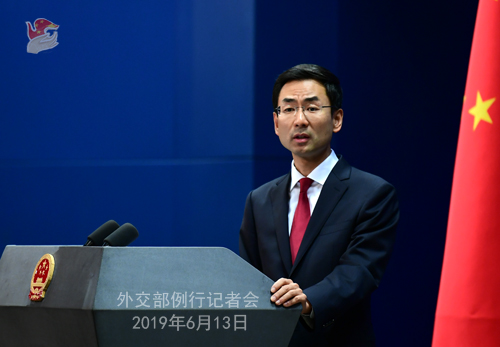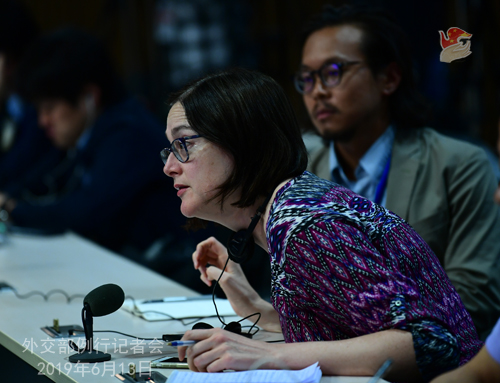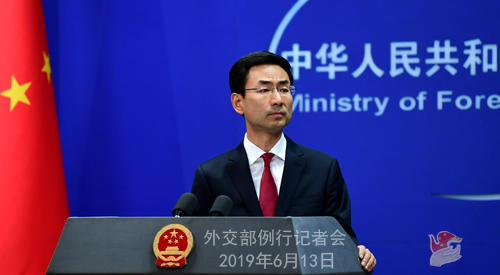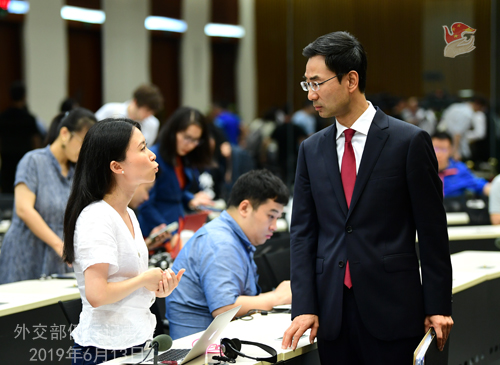| Foreign Ministry Spokesperson Geng Shuang's Regular Press Conference on June 13, 2019 |
| 2019-06-14 00:10 |
|
Q: The European Union in a statement has said that the proposed amendments could have potentially far-reaching consequences for Hong Kong and its people. Do you think these are valid concerns or irresponsible remarks by the EU? A: I have been answering similar questions all these past few days. Like we repeatedly said, Hong Kong affairs are purely China's internal affairs. No country, organization or individual has the right to interfere. China deplores and firmly opposes the irresponsible and erroneous comments on the amendment made by the EU side. We urge the EU to view the relevant amendment in a fair and just manner, exercise caution in its words and deeds, and stop in whatever form interfering in Hong Kong affairs and China's domestic affairs. Q: The George H. W. Bush Foundation for US-China Relations presented to former US President Jimmy Carter the inaugural George H. W. Bush Award for Statesmanship in US-China Relations at the Carter Center in Atlanta on June 12. The award is conferred to people who have made profound contributions to the development of constructive and mutually beneficial relations between China and the US. What's your comment? A: I saw this report. Four decades ago, the Chinese and US leaders, bearing in mind the fundamental interests of the two peoples and acting with extraordinary strategic vision and political courage, made a historic decision to establish diplomatic ties, which turned a new page in China-US relations. As a contributor and witness to this historic event, Mr. Carter has been devoted to promoting China-US relations during and after his presidency. We commend his efforts and congratulate him on receiving this award. Over the past four decades, the China-US relations have gone through a lot and made historic progress that brought enormous benefits to the two peoples and contributed to world peace, stability, development and prosperity. This four-decade experience proves that China and the US, as two major countries different in history and culture, social system, ideology and stage of development, can surely achieve mutual respect and win-win cooperation on the basis of non-conflict and non-confrontation. We noted that recently many people of vision in the US, including Mr. Carter, have called on the US administration to look at China's socio-economic development in an objective manner and work for more positive outcomes in bilateral cooperation. We hope the US government will earnestly heed these rational and pragmatic calls and learn from the beneficial experience of China-US relations over the past four decades. It needs to work with China to expand cooperation on the basis of mutual benefit, manage differences on the basis of mutual respect, and jointly advance the China-US relations featuring coordination, cooperation and stability, which will bring more benefits to the two peoples and the rest of the world. Q: Does the Central Government support the Hong Kong police in dispersing the protesters outside the Legislative Council? A: The Chief Executive and relevant officials of the Hong Kong SAR made statements on the latest situation, pointing out that what happened at Admiralty is not a peaceful assembly, but a blatant, organized riot. Any move that undermines Hong Kong's prosperity and stability is opposed by the mainstream public opinion there. Any civilized society ruled by law cannot tolerate illegal behaviors that damage peace and tranquility and defy the law. The central government of China strongly condemns all forms of violent actions and supports the Hong Kong SAR government in handling them in accordance with law.
Q: The Asia Society Policy Institute, a US think tank recently released a report titled Navigating the Belt and Road Initiative (BRI). Based on the Asia Society's policy discussions with BRI partner countries and field trips, the report spoke highly of the BRI's purposes and significance and offered its views and suggestions. Does China have any comment? A: You may know that in general, we don't make specific comments on media reports or the views of think tanks, experts and scholars. Here I will just make a principled response. We have noted this report. It shows that the BRI is gaining more attention and given more emphasis. The report also recognized the positive role of the BRI in promoting infrastructure connectivity and economic growth in partner countries. As to the views and suggestions it offered, I believe relevant Chinese departments value them and will study them carefully. Here I would like to point out that over the past six years, more than 150 countries and international organizations signed BRI cooperation deals with China. During the second Belt and Road Forum for International Cooperation (BRF), China issued the Belt and Road Initiative: Progress, Contributions and Prospects, showcasing consensus and progress on BRI cooperation and putting forward suggestions on high-quality development. We also issued outcome documents such as the Debt Sustainability Framework, the Beijing Initiative for the Clean Silk Road, and the Cooperation Initiative on Silk Road of Innovation. They all speak to the principle of consultation and cooperation for shared benefits that China proposed, and they demonstrate our readiness to pool wisdoms and strengths to advance the BRI cooperation. I would like to reiterate here that the principle of consultation and cooperation for shared benefits is the only path to high-quality BRI development, of which the essence is multilateralism. The BRI is an open and inclusive initiative for all like-minded partners. China stands ready to work with all partners to step up policy coordination, implement the outcomes reached at the forum, build a global partnership of connectivity and achieve new progress in high-quality international BRI cooperation. Q: As I understand, the Venezuelan government and opposition are in Sweden this week for talks. Is China sending a delegation? Second question, the founder of the encrypted messaging app Telegram said the app was hit by a cyber attack that has its origin in China, and suggested that it was linked to the Hong Kong protest. What's the ministry's comment on that? A: Regarding your first question, I'm not aware of the specifics you mentioned. What I can tell you is that China is willing to continue to keep in contact with relevant parties, promote peace and facilitate talks, jointly seek a peaceful settlement and uphold peace and stability in Venezuela and the region. As to the second question, I'm not aware of what you said. China always opposes cyber attacks of any form and we are also a victim of cyber attacks. We believe that all countries should jointly uphold cyber security through dialogue and cooperation on the basis of mutual respect, equality and mutual benefit. Q: For the first time, US President Trump responded to the Hong Kong SAR government's amendment of the Fugitive Offenders Ordinance. A White House spokesperson said that President Trump may talk about this with President Xi when they meet during the G20 Osaka Summit. Recently US Congressmen have been claiming that they will put forward a bipartisan act on human rights and democracy in Hong Kong, pushing the US government to reconsider Hong Kong's status. Is the central government concerned that the amendment will affect the international community's confidence in Hong Kong? How do you evaluate the impact of this incident on Hong Kong globally? A: I have responded to several questions on US statements about a summit between the two heads of state during the G20 Osaka Summit. We have noted the US public statements on many occasions expressing hope for such a summit. If there is any information on that, we will release it in a timely manner. On the latest US remarks regarding Hong Kong, just as I said earlier, Hong Kong affairs are purely China's domestic affairs. We are firmly against interference from any country, organization or individual. We urge the US to view the SAR government's lawful amendment in an objective and unbiased way, be prudent in words and deeds and stop interfering in Hong Kong affairs and China's domestic affairs in any form. As to the "one country, two systems" policy and international confidence in Hong Kong, I can assure you that since the return of Hong Kong, policies of "one country, two systems", "Hong Kong people administering Hong Kong" and a high degree of autonomy have been faithfully implemented. The SAR has retained prosperity and stability and remains one of the world's freest economies and most competitive regions rated by many international institutions. Concerns that the amendment will shake the international community's confidence in Hong Kong are completely unnecessary.
Q: Canadian Prime Minister Justin Trudeau's office has said that in January China ignored a request by Trudeau to have a discussion with Premier Li Keqiang on the two Canadians who were detained in December. And last month, the Canadian foreign minister said that she had made a request for a dialogue with her Chinese counterpart Wang Yi to no avail. Does this signal a diplomatic freeze between Beijing and Ottawa? A: I have not heard about what you said. What I can say is that the current difficulties in China-Canada relations are caused solely by the Canadian side. It must assume full responsibility. We hope Canada will take China's solemn concerns seriously, release Ms. Meng Wanzhou without further delay and ensure that she returns to China safe and sound. It needs to take concrete measures to bring bilateral relations back to the right track at an early date. Q: How many people were on the streets protesting in Hong Kong at the height of the protests over the past few days? A: I'd refer you to the Hong Kong SAR government for that. Q: China and the Pacific island nation of Vanuatu recently signed a deal on a feasibility study to develop a port. US intelligence is concerned this could be a dual-use port. Could you please offer some details about this deal? A: I haven't heard of that. What I can say is that China maintains friendly cooperative relations with Pacific Island countries including Vanuatu. Chinese assistance and support in these countries' development has been warmly appreciated and highly welcomed by the people there. As we repeatedly stated, China will be glad to see other countries offering concrete help and funds to the island countries for their development and their people's welfare. It's better to take tangible measures than to doubt China's contributions. Q: Is China concerned that should this protest in Hong Kong continue, the Legislative Council may decide to make some changes to the amendment to the extradition bill? A: The Hong Kong SAR government has made statements on the amendment issue. According to my information, the SAR government has widely solicited public opinions on the amendment and modified the draft twice in response to the suggestions. As to how relevant work will proceed, I'd refer you to the SAR government. I'd like to reiterate that the central government of China will continue to support the Hong Kong SAR government in advancing the amendment to the two ordinances.
|
 |
|



